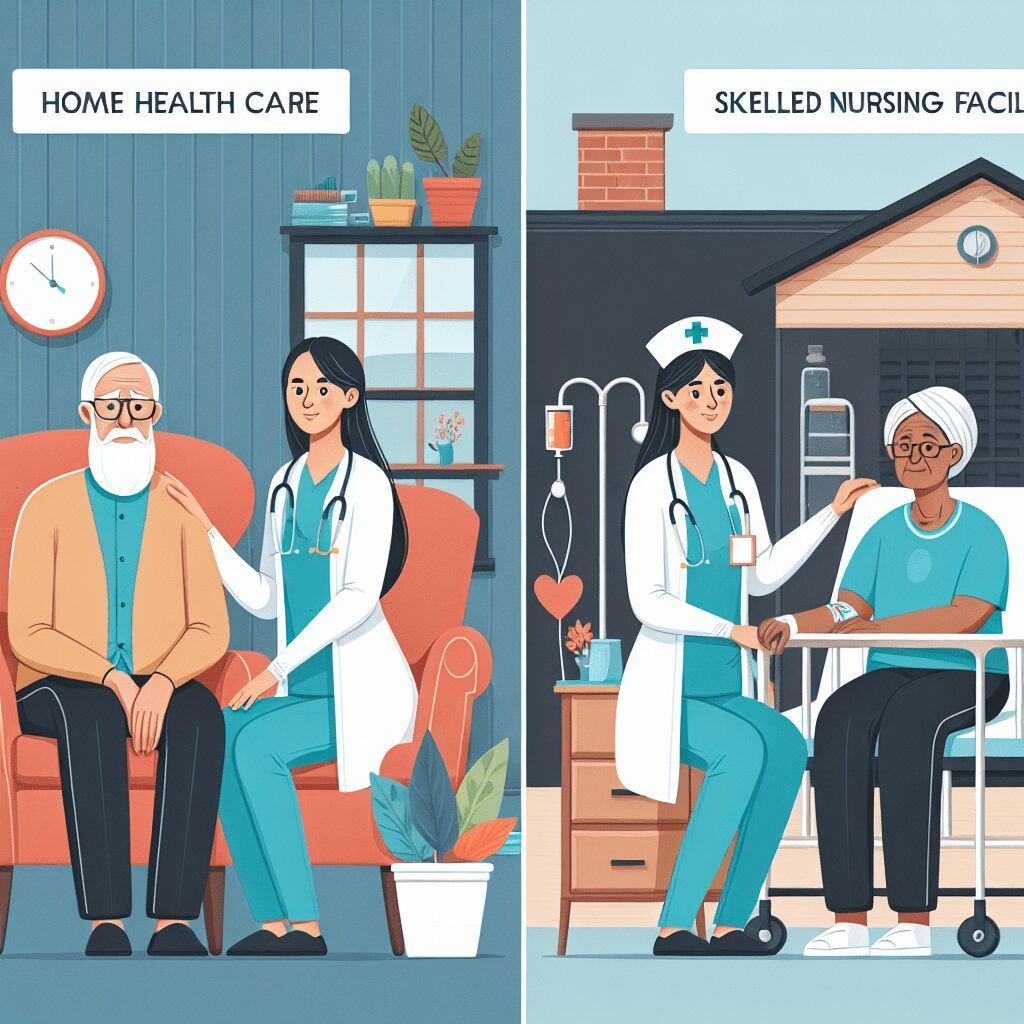Exploring the Role of SNF in Hospice Care
It’s critical to grasp the various aspects of healthcare, such as skilled nursing facilities (SNFs) and hospices, for providing quality patient care. SNFs provide services like nursing care, therapy, and meals to address post-acute care needs. On the other hand, hospice care focuses on providing comfort to individuals nearing the end of life. Understanding how SNFs and hospices collaborate with DME suppliers within the legal framework is essential to ensure patients receive proper care.
Let’s learn more about SNFs and hospices and their roles in patient care.
Understanding the Role of SNFs in Hospice Care
Overview of SNFs and Their Importance
SNFs are important in hospice care. They help patients needing skilled nursing care after leaving the hospital before transitioning to hospice. SNFs focus on helping patients recover and go home after a hospital stay. These facilities impact the quality of care for hospice patients by providing disease treatment, medications, and therapy. SNFs also contribute to the holistic care of hospice patients by offering higher medical care levels than other facilities.
They employ various nursing professionals and services, including disease treatment and management, to ensure comprehensive and specialized care for hospice patients. This connection with hospice care highlights the significance of SNFs in improving comfort, support, and well-being for individuals in their final life stages.
Relationship Between SNFs and Hospice Care
Establishing a strong relationship between skilled nursing facilities and hospice care providers is beneficial. It helps ensure seamless coordination of patient care, which is especially important for patients in need of end-of-life services.
Effective communication and collaboration between SNFs and hospice care teams are key. They can significantly enhance patient outcomes. By facilitating the delivery of comprehensive, patient-centered care.
Coordinating care between SNFs and hospices may be challenging, as differing payment structures and regulatory requirements may affect the process. Implementing solutions is crucial.
Solutions like clear communication channels, standardized care protocols, and regular interdisciplinary team meetings can help overcome these challenges. They promote continuity of care for patients receiving services from both SNFs and hospices.
By working together, SNFs and hospice providers can optimize the quality of care for Medicare beneficiaries. This helps ensure that patients receive necessary support and services during their stay in skilled nursing facilities or hospice settings.
Regulations and Legislations Impacting SNFs in Hospice Care
State Laws Governing SNFs and Hospice Care
State laws in a region affect DME suppliers, assisted living facilities, and SNFs. These laws govern care for Part A patients and relationships between healthcare providers and referral sources. Updates to these laws can impact service delivery, payment structures, and compliance with regulations like the anti-kickback statute. Knowing these rules is vital for quality care and fair practices in healthcare for Medicare beneficiaries.
Medicare Reimbursement Rules for SNFs in Hospice Care
SNFs in hospice care must follow specific Medicare rules for Part A patients.
DME suppliers provide necessary products and services to these patients and bill Medicare or Medicare Advantage Plans.
Per diem payments from Medicare influence the financial operations of SNFs that provide hospice care and cover DME supplies.
Hospice services focus on end-of-life care and symptom management, involving physicians, nurses, and social workers.
Federal guidelines like anti-kickback and beneficiary inducement laws aim to ensure compliance and prevent unlawful referrals or inducements.
Quality of life, spiritual care, and patient symptom management are top priorities for SNFs in hospice care.
Interdisciplinary healthcare professionals must collaborate effectively to enhance patient care.
Regulations for operating SNFs in hospice care ensure proper care and compliance with legal standards in the healthcare industry.
Federal Guidelines Addressing SNF Practices in Hospice Care
SNFs providing hospice care must adhere to specific federal guidelines to ensure quality care for patients. These guidelines include regulations set by the Centers for Medicare and Medicaid Services (CMS) to certify that SNFs meet established standards of care. Adherence to these regulations is crucial for SNFs to receive payment through Medicare programs.
Additionally, SNFs are subject to annual inspections to ensure compliance, and any deficiencies found must be corrected promptly. These regulations play a vital role in maintaining the standard of care and ensuring patient safety within SNFs offering hospice services.
Furthermore, DME suppliers are critical in supporting SNFs by providing necessary products and services to hospice patients in SNF settings. However, DME suppliers must avoid violating the federal anti-kickback statute by ensuring fair market value compensation for their services. By following these guidelines and regulations, SNFs can continue to offer essential hospice care services while upholding the highest standards of quality and compliance in patient care.
Cost Considerations in Utilizing SNFs for Hospice Care
Evaluating the Financial Impact of SNFs on Hospice Care
To evaluate the financial impact of skilled nursing facilities on hospice care, one can start by analyzing Medicare reimbursement rules. These rules cover how Part A patients in SNFs are treated under traditional Medicare.
Understanding these rules is important to understanding how they affect DME suppliers who serve these patients. It’s also essential to look at how hospice services play a role in end-of-life care and the financial agreements among hospices, SNFs, and DME suppliers.
Another critical aspect is considering the regulatory environment, like compliance with anti-kickback statutes. These laws affect how healthcare providers interact with SNFs and assisted living facilities.
Additionally, it is crucial to explore fair market value in compensation agreements between facilities and DME suppliers. This helps maintain ethical standards and ensure top-notch care for patients in hospice and skilled nursing settings.
Importance of Nursing Care at SNFs for Hospice Patients
Nursing care at skilled nursing facilities is crucial for hospice patients’ well-being.
Skilled nursing facility nurses play a vital role in providing specialized care. They ensure patients receive medical attention, symptom management, and emotional support during their end-of-life journey.
Collaboration between SNF staff and hospice providers is essential to maintaining care quality and improving patients’ quality of life.
DME suppliers can work with SNFs and hospices to provide necessary products and services to Medicare beneficiaries by following regulations.
Proper coordination and adherence to legal standards help in providing seamless care for hospice patients. This includes emphasizing palliative care, symptom management, grief support, and spiritual care to ensure comfort and dignity in their final stages of life.
Resources Available for SNFs Providing Hospice Care
Tools and Support for SNFs Engaged in Hospice Care
Tools and support for SNFs that provide hospice care aim to improve patient care quality.
-
Access to DME suppliers is essential for furnishing necessary products to Part A and hospice patients.
-
Regulatory guidance ensures compliance with laws like the Anti-Kickback Statute.
-
Hospice services offer crucial end-of-life care to patients with terminal illnesses and their families.
-
Innovative technologies help SNFs effectively manage hospice care, addressing unique patient needs.
-
These tools assist with symptom management, medication administration, grief support, and spiritual care, improving patient outcomes and satisfaction in SNFs.
Addressing Fraud Issues in SNFs Offering Hospice Care
Fraudulent practices in SNFs offering hospice care can include:
-
Improper billing for services
-
Kickbacks for referrals
-
Providing unnecessary or substandard care to patients
DME suppliers should avoid illegal activities that violate anti-kickback statutes or beneficiary inducement laws.
Compliance with regulations is crucial to prevent fraud and uphold the integrity of hospice care in SNFs.
Establishing clear policies, conducting audits, and providing staff training can enhance transparency and accountability.
This proactive approach helps reduce fraud risks and ensures high-quality care without compromising ethical standards.
Effective communication among DME suppliers, facility staff, and regulatory authorities is essential to maintain a culture of compliance and prevent fraud in SNFs offering hospice care.
Challenges and Solutions in SNFs Integrating with Hospices
SNFs face challenges when integrating with hospices, including communication, care coordination, and reimbursement processes. DME suppliers provide products and services to Part A patients in skilled nursing facilities and hospices. Following regulations like the Anti-Kickback Statute is crucial to avoid legal issues, and SNFs must pay DME suppliers fairly to stay compliant. Hospice services focus on end-of-life care, offering symptom management, medication, and emotional support.
Coordination between SNPs, hospices, and DME suppliers is crucial for quality care, especially for Medicare beneficiaries needing palliative care. Grief support, spiritual care, and additional clinical staff from hospice services enhance the quality of life for patients in long-term care settings.
The Benefits of In-Home Hospice Care Services
In-home hospice care services provide an alternative to SNF-based hospice care, allowing patients to receive end-of-life care in the comfort of their own homes. This approach offers several significant benefits, including a familiar and comforting environment, personalized care, and the ability for family members to be more involved in the caregiving process. In-home hospice care focuses on managing symptoms, providing emotional support, and enhancing the quality of life for patients during their final days.
One of the key advantages of in-home hospice care is the ability to tailor care plans to the specific needs and preferences of the patient. Therapists and hospice care providers work closely with family members to create a supportive environment that promotes comfort and dignity. This personalized approach ensures that patients receive the necessary medical interventions while maintaining a sense of normalcy and connection with their loved ones. In-home hospice care also facilitates better communication between caregivers and healthcare providers, allowing for more responsive and coordinated care.
Accessibility and Flexibility of In-Home Hospice Care
In-home hospice care is increasingly accessible due to advancements in telehealth and the expansion of home health services. Patients and families can receive professional guidance and support from healthcare providers through virtual consultations, ensuring continuous care and monitoring. This flexibility allows patients to remain in a familiar setting while still benefiting from the expertise of hospice care professionals. Moreover, in-home hospice care can be a more cost-effective option compared to institutional care, reducing the financial burden on families.
In conclusion, while SNFs play a crucial role in providing hospice care, in-home hospice care services offer a valuable alternative that prioritizes the comfort, dignity, and quality of life of patients. By receiving care in their homes, patients can maintain a closer connection with their families and enjoy a more personalized and flexible approach to end-of-life care. Whether through SNFs or in-home services, the goal remains the same: to provide compassionate and comprehensive care that supports patients and their families during this challenging time.
FAQ
What is the role of an SNF in hospice care?
SNFs provide 24-hour care, symptom management, and support for hospice patients. They offer services like pain management, assistance with ADLs, emotional support, and coordination of care.
How can SNFs help provide for the needs of terminally ill patients in hospice care?
SNFs can provide a comfortable and peaceful environment for terminally ill patients in hospice care by offering 24/7 nursing care, pain management services, emotional support, and coordinating with hospice agencies for specialized care.
What services do SNFs typically offer to patients in hospice care?
SNFs typically offer services such as pain management, symptom control, 24/7 nursing care, personal care assistance, spiritual and emotional support, and family counseling to patients in hospice care.
How does collaboration between SNFs and hospice providers benefit patients?
Collaboration between SNFs and hospice providers benefits patients by ensuring seamless transitions, comprehensive care coordination, and improved quality of life. This partnership can lead to reduced hospital readmissions, better pain management, and enhanced emotional support for patients and their families.
What factors should be considered when selecting an SNF for hospice care?
Factors to consider when selecting an SNF for hospice care include location, staff expertise, available services, cleanliness, and communication. For example, choose a facility with experience in end-of-life care, close to family members, and clear communication with the hospice team.
Experience the compassionate alternative to traditional SNF hospice care with ABET Life Home Health & Caregiving. Our in-home hospice services provide personalized, comprehensive care in the comfort of your own home, ensuring dignity and peace for your loved ones. Contact us today to discover how our dedicated team can support you during this critical time.
The post Exploring the Role of SNF in Hospice Care first appeared on Home Health & Care Giving Service in Houston, TX.

Whether dealing with chronic illness or needing help recovering a surgery, ABET Life will support you with our focused care — covered by Medicare or other insurance carriers for qualified patients.
USEFUL LINKS
All Rights Reserved | AbetLife, Inc | Terms of Use | Privacy Policy











